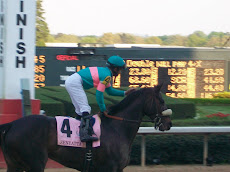Ernest Hemingway published one of his best works, The Old Man and the Sea, in 1952 that recounted an epic battle between a beaten down, aging fisherman who tirelessly pursued the catch of his life. This story symbolizes the persona of the great thoroughbred we mourn today, John Henry (1975 – 2007). This old man’s journey started at New Orleans bush tracks near the Gulf of Mexico, then to New York’s Atlantic coast before heading west to the warmer waters of the Pacific Ocean. In pursuit of his “big prize” on the track, JH was sent to the care of Ron McAnally in southern California. Perhaps because of this fortuitous twist of fate, McAnally is now hailed as one of the most acclaimed turf trainers in U.S. history.
John Henry was perhaps one start away from being considered “the greatest” - or at least the most revered - instead of “among the greatest” of racing’s champions over the last half century, including Secretariat, Seattle Slew, Affirmed and the elder statesmen Forego and Kelso (who also had 39 career victories). In his final year of racing in 1984, John Henry won four Grade one races including the Arlington Million and Hollywood Invitational. Hollywood Park was the same turf course where longshot Lashkari won the inaugural Breeders’ Cup Turf later in 1984 while JH was sidelined with an injury. That could have been the most compelling of his 30 stakes race (25 Graded) victories spanning eight consecutive racing seasons, including a combination of seven Eclipse Awards. However, the headstrong gelding already had a tally of significant accomplishments on the track, including the inaugural (and two time) winner of the Arlington Million as well as the first two time winner of the esteemed Santa Anita Handicap. These victories helped buoy his lifetime earnings to become the first horse to break the sequential million dollar marks for purse money barrier, ending with a prodigious $6.5 million over two decades ago!
Speaking of longevity, many have heard about the exploits of Seabiscuit through Laura Hildebrand’s book of the same name or the recent big screen adaptation. And while it is true that Seabiscuit raced six more times (89 versus 83 for JH), an astonishing 58 of those starts were during Seabiscuit’s two and three year old campaigns, when he was still running in anonymity. That is probably why Seabiscuit was limited to five starts total over his final racing years of ages 6 and 7. Whereas, JH saved his best for last, culminating with an 8 of 9 in-the-money finishes at the geriatric age of 9, while registering Horse of the Year honors and amassing six victories and $2.3 million in purse money. He was also voted the racehorse for the decade of the 1980’s when the racing industry was at its peak, prior to the late eighties decline due to harmful tax revisions made in the Internal Revenue Code.
In The Blood-Horse ranking of the top 100 U.S. thoroughbred champions of the 20th century, John Henry came in at a respectable #23. However, from a fan’s perspective, it is clear to me that from the current message boards that number would be 1, 2, or 3. I’ve noticed more blogs within 48 hours of his death than corresponding tributes to Barbaro after that recent tragedy. And these are not the generic “we love you and will miss you” postings. These testimonies run much deeper from individuals ranging in age from mid-thirties to their golden years, who vividly recall JH’s countless exploits and bullish attitude. Reading the message board at his home of 22 years (www.kyhorsepark.com) even brought me to tears, yet I can only marginally recall that first Arlington Million when John Henry burst onto the racing scene some twenty-six years ago.
My grandfather Dussex -- another cranky old cuss who, like John Henry could intimidate men half his age -- had a favorite saying… “Give someone a rose while they are alive instead of when they are gone.” Much of the public had forgotten the great John Henry amidst the brilliant potential of recent three-year old sensations Smarty Jones, Afleet Alex and Barbaro. But as horses such as these come and go with each season, it is impossible to look past the indelible record that John Henry produced as the iron man of the oval. I look forward to visiting the Kentucky Horse Park soon to pay my last respects with a rose of memorial to the venerable millionaire. And for his equine friend (Cigar) across from his stall for the past ten years, I will bring a rose to recognize what John Henry just willed to him… the greatest Champion alive. I guess John Henry wasn’t too mean to die after all.
January 8, 2008
Subscribe to:
Post Comments (Atom)














No comments:
Post a Comment